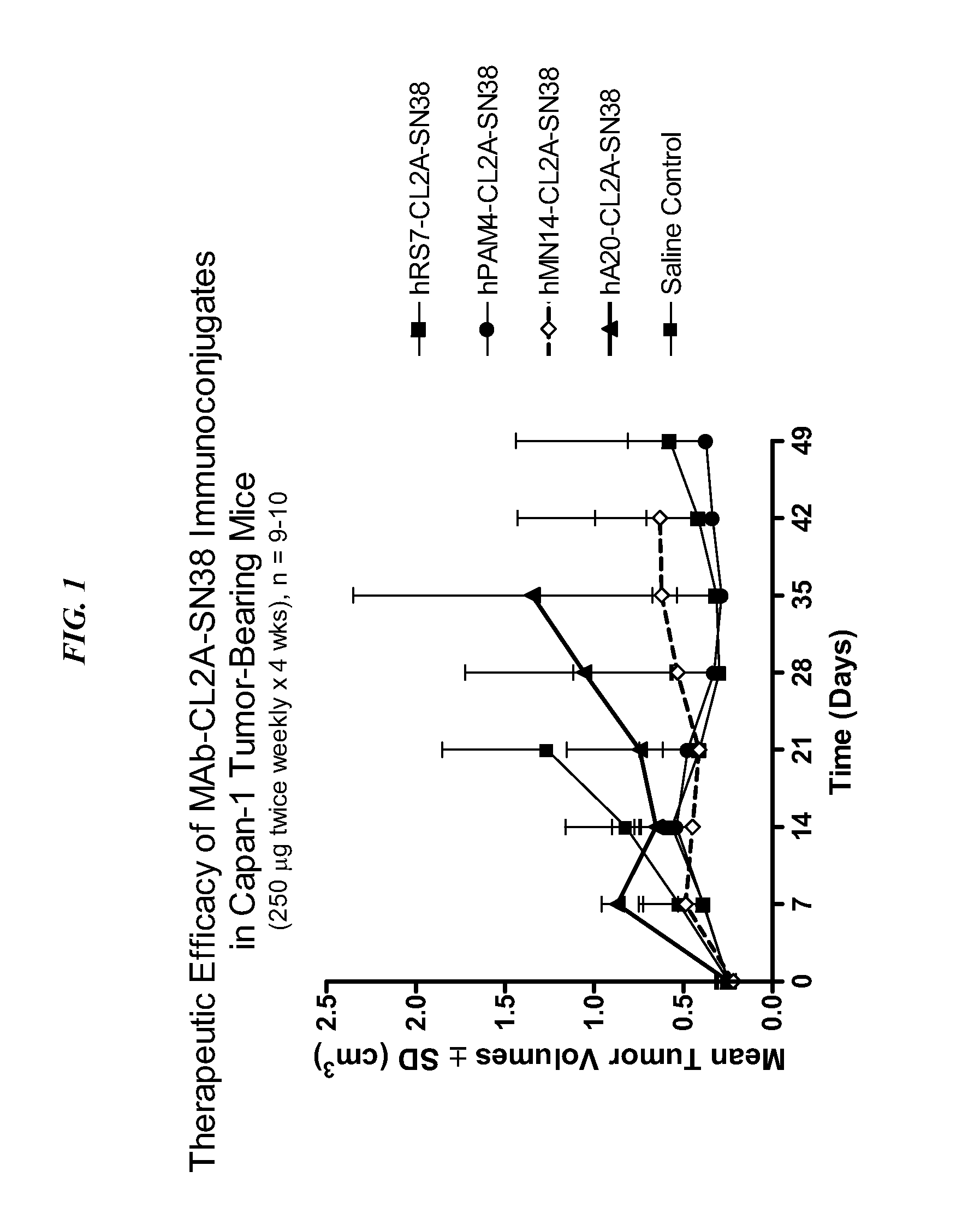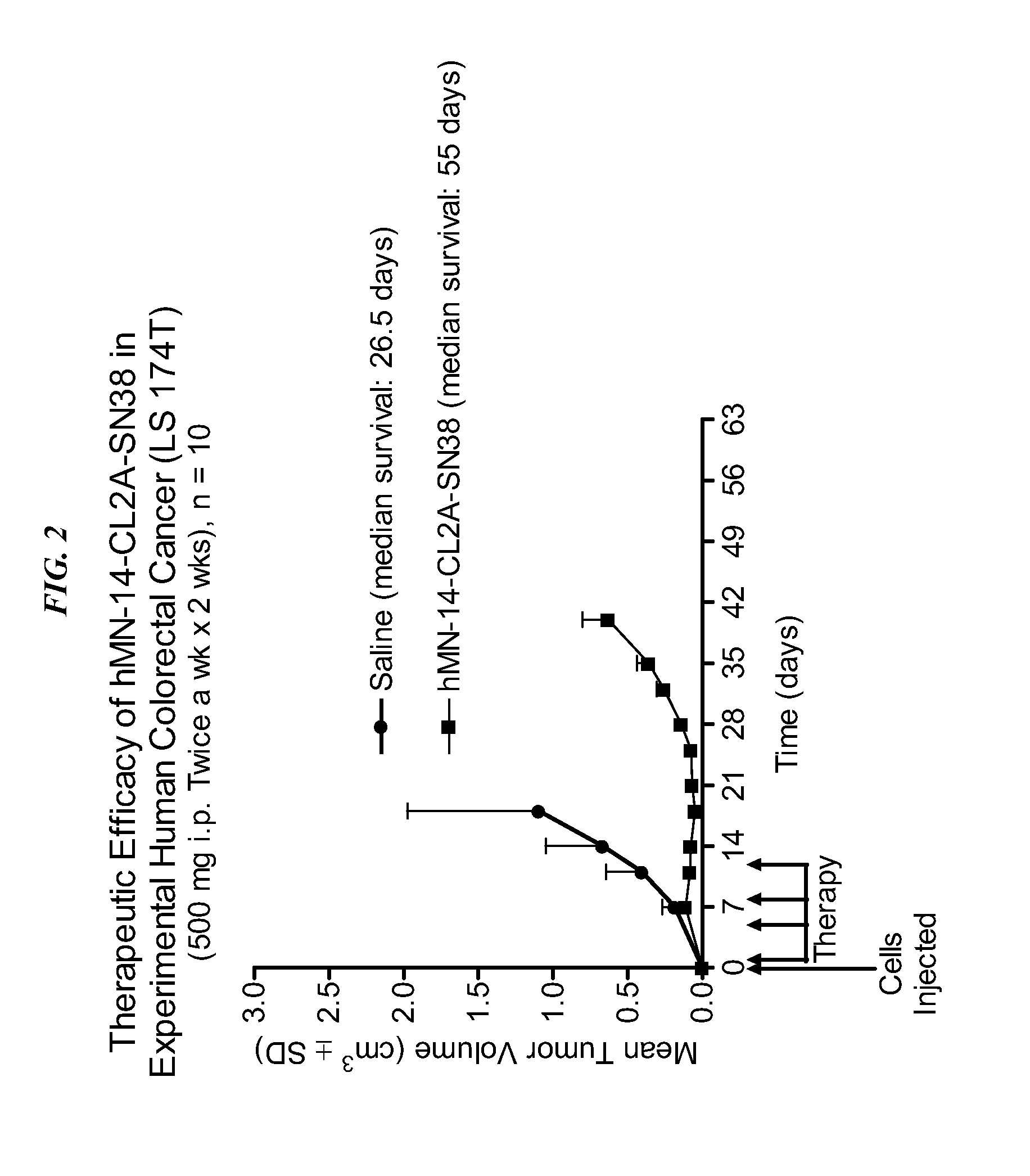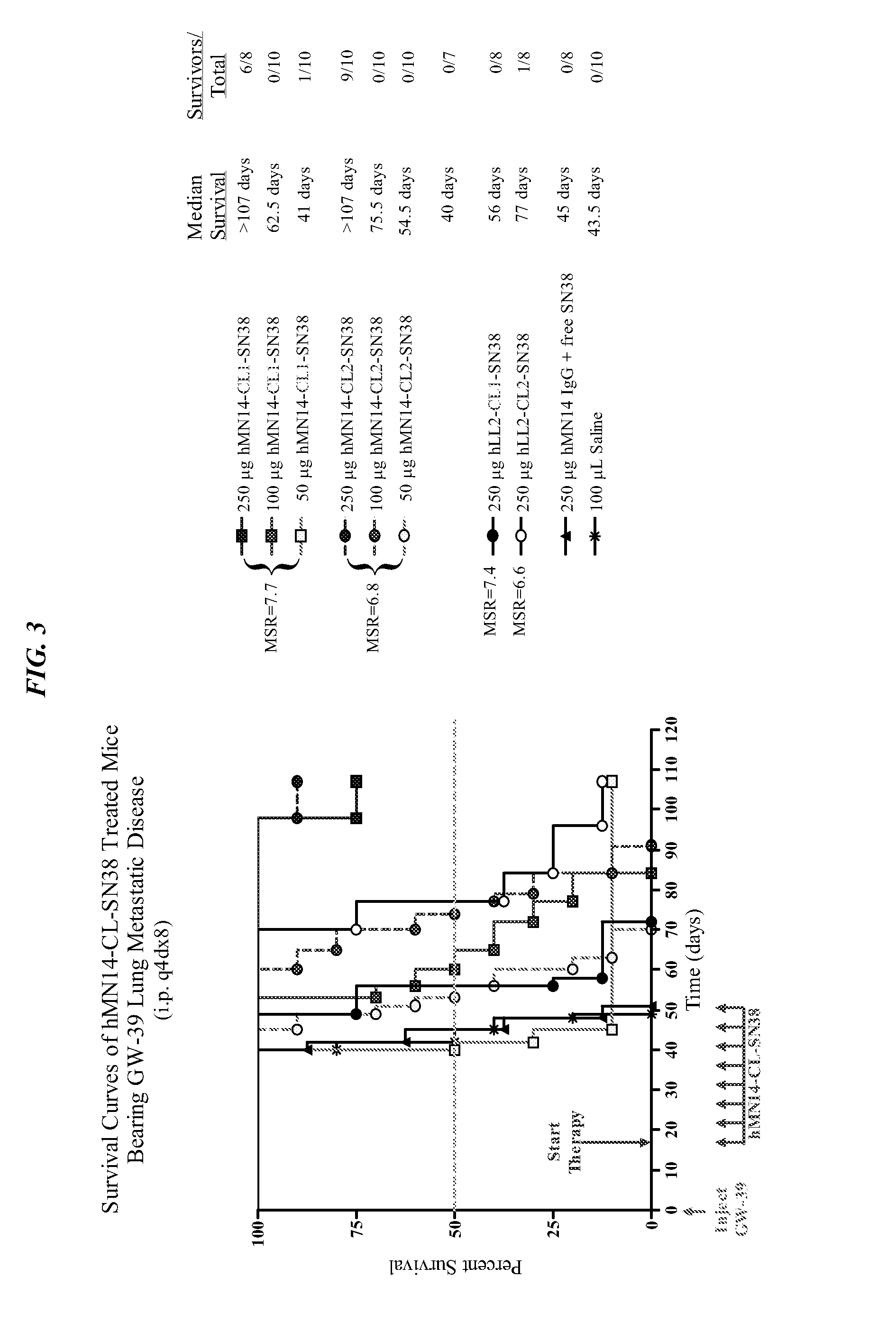Humanized Anti-ceacam5 antibody and uses thereof
a humanized, anti-ceacam technology, applied in the field of cancer chemotherapy, can solve the problems of limiting the diagnostic or therapeutic agent from reaching the target site, reducing the effective concentration of the targeting agent, and limiting the diagnostic or therapeutic agent. the effect of overcoming tumors, improving targeting, and enhancing the delivery of the therapeutic agen
- Summary
- Abstract
- Description
- Claims
- Application Information
AI Technical Summary
Benefits of technology
Problems solved by technology
Method used
Image
Examples
example 1
Production of a Class III Anti-CEA Antibody
[0170]Murine, chimeric and humanized forms of the MN-14 antibody, comprising the light chain CDR sequences CDR1 KASQDVGTSVA (SEQ ID NO:5), CDR2 WTSTRHT (SEQ ID NO:6), and CDR3 QQYSLYRS (SEQ ID NO:7), and heavy chain CDR1 TYWMS (SEQ ID NO:8), CDR2 EIHPDSSTINYAPSLKD (SEQ ID NO:9) and CDR3 LYFGFPWFAY (SEQ ID NO:10), were prepared as disclosed in Hansen et al., U.S. Pat. No. 5,874,540, the Figures and Examples section of which are incorporated herein by reference.
[0171]The biodistribution of labeled humanized MN-14 IgG in nude mice bearing human colon cancer was determined. For radiolocalization studies, at 4-5 weeks female athymic mice (nu / nu, Harlan, Indianapolis, Ind.) were given s.c. 0.2 ml of a 10% suspension of LS174T human colon adenocarcinoma prepared from a xenograft serially propagated in an athymic mouse (Sharkey et al., Cancer Res., 50: 828-34 (1990)). After waiting 2 weeks for tumor development, the mice were injected i.v. with 20 ...
example 2
In Vivo Therapeutic Efficacies in Preclinical Models of Human Pancreatic or Colon Carcinoma
[0173]The efficacy of drug-conjugated Class III anti-CEA antibody was investigated. Immunoconjugates comprising antibody-SN-38 conjugates were prepared as discussed in U.S. Pat. No. 7,999,083, the Figures and Examples sections of which are incorporated herein by reference. Immune-compromised athymic nude mice (female), bearing subcutaneous human pancreatic or colon tumor xenografts were treated with either specific CL2A-SN-38 conjugate or control conjugate or were left untreated. The therapeutic efficacies of the specific conjugates were observed. FIG. 1 shows a Capan 1 pancreatic tumor model, wherein specific CL2A-SN-38 conjugates of hRS7 (anti-EGP-1), hPAM4 (anti-mucin), and hMN-14 (anti-CEACAM5) antibodies showed better efficacies than control hA20-CL2A-SN-38 conjugate (anti-CD20) and untreated control. Likewise, in an aggressive LS174T model of human colon carcinoma, treatment with specifi...
example 3
In Vivo Therapy of Lung Metastases of GW-39 Human Colonic Tumors in Nude Mice Using hMN-14-[CL1-SN-38] and hMN-14-[CL2-SN-38]
[0174]Alternative immunoconjugates, comprising different linkers between the antibody and the SN-38, were prepared as disclosed in U.S. Pat. No. 7,591,994, the Figures and Examples section of which are incorporated herein by reference. A lung metastatic model of colonic carcinoma was established in nude mice by i.v. injection of GW-39 human colonic tumor suspension, and therapy was initiated 14 days later. Specific anti-CEACAM5 antibody conjugates, hMN14-CL1-SN-38 and hMN14-CL2-SN-38, as well as nontargeting anti-CD22 antibody control conjugates, hLL2-CL1-SN-38 and hLL2-CL2-SN-38 and equidose mixtures of hMN14 and SN-38 were injected at a dose schedule of q4d×8, using different doses. FIG. 3 (MSR=SN-38 / antibody molar substitution ratio) shows selective therapeutic effects due to hMN-14 conjugates. At equivalent dosages of 250 μg, the mice treated with hMN14-CL...
PUM
| Property | Measurement | Unit |
|---|---|---|
| Force | aaaaa | aaaaa |
| Length | aaaaa | aaaaa |
| Length | aaaaa | aaaaa |
Abstract
Description
Claims
Application Information
 Login to View More
Login to View More - R&D
- Intellectual Property
- Life Sciences
- Materials
- Tech Scout
- Unparalleled Data Quality
- Higher Quality Content
- 60% Fewer Hallucinations
Browse by: Latest US Patents, China's latest patents, Technical Efficacy Thesaurus, Application Domain, Technology Topic, Popular Technical Reports.
© 2025 PatSnap. All rights reserved.Legal|Privacy policy|Modern Slavery Act Transparency Statement|Sitemap|About US| Contact US: help@patsnap.com



